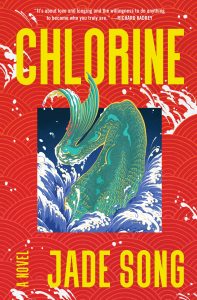Ian Mond Reviews Chlorine by Jade Song
 Chlorine, Jade Song (William Morrow 978-0-06325-760-3, $27.99, 256pp, hc) March 2023.
Chlorine, Jade Song (William Morrow 978-0-06325-760-3, $27.99, 256pp, hc) March 2023.
From the moment we meet Ren Yu, the narrator and protagonist of Jade Song’s debut novel Chlorine, she leaves us in no doubt about her identity. Ren is a mermaid, though, as she’s quick to point out, nothing like those generic mermaids from movies and ‘‘G-rated fairytales, the blood and dirt in their original drafts scrubbed clean by salarymen in suits.’’ Ren’s variety of mermaid – made, not born – wears a one-piece swimming suit, sprouts ‘‘thick and luscious body hair’’ that’s shaved before each swim meet and relishes the chemical scent of chlorine. Ren’s journey to mermaidhood begins at the age of four, handed a book by her mother about mermaid folklore from across the globe. An obsession with the stories in the book – ‘‘The folktale I loved most was the Passamaquoddy tale of two girls changed into water-snakes’’ – leads seven-year-old Ren to try out for the swim team at the local high school:
When I dove into the pool, I felt like I had arrived home, like my seven years of life until then had been one long cross-country car ride, and the pool was the hot shower to wash off the filth collected from roadside stands and gas station bathrooms. I was liberated, unblemished, and one step closer to becoming the mermaid I always intended to be.
That sense of joy and well-being is limited to the water. Outside of the pool, as a member of the swim team, Ren is confronted with her sleazy, violent coach, the jealousy of her teammates, the rigid expectations of her mother, and the challenges of being a teenage girl coming to terms with her changing body. Ren’s only relief, aside from the chlorinated water, is her best friend, Cathy, also on the swim team, who is clearly besotted with Ren. But Cathy’s adoration is a temporary salve. Ren understands she will only find peace and comfort once she has physically transformed into a mermaid, no matter how agonising the process.
Early reviewers have characterised Chlorine as ‘‘body horror,’’ a classification typically applied to zombies, mutations, and the unnatural meshing of flesh and steel. But as Jade Song points out in an interview with Fantasy Hive, Ren’s physical trauma is bedded in the real world: ‘‘People bleed, people self-harm, people are abusive.’’ When Ren struggles to insert a tampon just before a swim meet (having only done it once with her mother), she describes not only the pain and frustration but also, in forensic detail, the failed act of insertion. The scene becomes all the more graphic when Ren pulls Cathy into the cubicle, desperate for help. I found this extended moment hard to read (I put my Kindle down to take a breather), and to that extent, for me, Song creates the effect of ‘‘body horror.’’ But others may not have this reaction. In fact, I suspect that for many cisgender women, transmen and nonbinary folk, this scene will actually resonate. They might not view it as ‘‘body horror’’ but as a fact of their existence.
We get the same level of forensic intimacy when Ren details her life as an athlete, whether it be the shaving sessions (where every skerrick of bodily hair is removed to reduce drag), the repetitive stresses on her body and the violent tendencies of Coach Jim, prone to throwing chairs at any swimmer who doesn’t meet his standards. The way it’s depicted is brutal, but it’s not ‘‘body horror.’’ Rather, it’s reflective of a society that’s fine with damaging the body of teenagers for the pursuit of sport but horrified if that same child seeks gender-affirming surgeries. And that, of course, is the key message of Chlorine. As we see across certain parts of America, a child’s sexuality and identity are not their own; they are imposed upon them either by their parents or, to an ever-increasing degree, the State.
Ren’s transformation into a mermaid is complicated by her cultural heritage. A child of Chinese immigrants, Ren is not interested in assimilating into mainstream American culture. At a swimming final, she is arm-twisted by Cathy to choose the ‘‘meaningless sounds’’ of ‘‘Don’t Stop Believin’’’ as her introductory tune, rather than her preference 胡思乱想, by her favourite actor and musician Faye Wong, whom Cathy is adamant no-one will have heard of. The novel’s most tender moments involve Ren and her mother watching and rewatching Chungking Express (which stars Faye Wong) and listening to Wong’s songs on CD. So, it’s all the more heartbreaking when toward the end of Chlorine, that mother-daughter bond is broken because Ren’s mother can’t accept her daughter’s mermaid self.
Not every aspect of Chlorine works for me. I felt the chapters told from Cathy’s perspective – multiple letters sent in bottles where she declares her love for Ren – while heartfelt, become repetitive, playing back scenes we’ve already seen from Ren’s perspective. But while these chapters don’t seem to add much to the overall narrative, they also don’t dilute the intensity of this powerful debut novel.
Ian Mond loves to talk about books. For eight years he co-hosted a book podcast, The Writer and the Critic, with Kirstyn McDermott. Recently he has revived his blog, The Hysterical Hamster, and is again posting mostly vulgar reviews on an eclectic range of literary and genre novels. You can also follow Ian on Twitter (@Mondyboy) or contact him at mondyboy74@gmail.com.
This review and more like it in the June 2023 issue of Locus.
 While you are here, please take a moment to support Locus with a one-time or recurring donation. We rely on reader donations to keep the magazine and site going, and would like to keep the site paywall free, but WE NEED YOUR FINANCIAL SUPPORT to continue quality coverage of the science fiction and fantasy field.
While you are here, please take a moment to support Locus with a one-time or recurring donation. We rely on reader donations to keep the magazine and site going, and would like to keep the site paywall free, but WE NEED YOUR FINANCIAL SUPPORT to continue quality coverage of the science fiction and fantasy field.
©Locus Magazine. Copyrighted material may not be republished without permission of LSFF.







